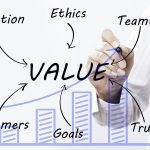Accountancy within organizations has been around practically since the existence of organizations itself. As long as we can recall, we have kept track of what happened within an organization, or in the old days while farming or herding. The earliest records of accounting data back 7.000 years ago, from the ruins of Babylon, where the growth of crops and herds were recorded. … [Read more...] about Big Data Governance: Controlling and Handling Data
Big Data
Learn everything you need to know about big data. Find out how companies are using this revolutionary technology and what it means for your business strategy.
How To Draw Value From The Big Data Tsunami – Video
In order to understand the challenges and opportunities from the big data tsunami, the French business school ESSEC brought together a group of professionals. Vincenzo Esposito Vinzi, professor of Statistics and Decision Sciences, and Dean of Faculty at ESSEC Business School; Nicolas Glady, professor of Marketing at ESSEC Business School; and Patrick Luciano, Market … [Read more...] about How To Draw Value From The Big Data Tsunami – Video
Have Marketers Taken Big Data Too Far?
Paula Rosenblum writes a fun piece regarding the creepiness of retailers using their Big Data. In it, she contends that targeting our past purchases to send us relevant offers is smart business, but that the use of retargeting tools and practices is downright creepy. But how creepy is it really? We, as consumers, have enabled this sort of behavior, have we not? We get certain … [Read more...] about Have Marketers Taken Big Data Too Far?
A Paradigm Shift Awaits The Media And Entertainment Industry
The media and entertainment industry is awaiting a paradigm shift in the coming years. For many years, this industry was about sending information/entertainment to readers / viewers / users at a moment they thought appropriate (think the TV channels). The broadcasting planning was made based on historical analyses and what the Chief Editor deemed best for the audience. With big … [Read more...] about A Paradigm Shift Awaits The Media And Entertainment Industry
New And Profitable Insights With Tracking Customer Movements
RetailNext and Prism Skylabs offer tools for retailers to learn from their customer movements. RetailNext is prominently present in the world's Top 10 of most innovative companies in Big Data and offers in-store analytics based on analysing sensors and images of security cameras. Prism Skylabs has a more basic offering with its product. Can showrooming be stopped?Have you ever … [Read more...] about New And Profitable Insights With Tracking Customer Movements
What is big data?
Big data is a term that refers to the massive amount of digital data created and shared every day. Big data can transform how we live, work, and communicate. It can be used to improve everything from public health and urban planning to business and marketing.
Big data is also changing the way we think about privacy and security. The volume, velocity, and variety of big data present challenges and opportunities for organizations and individuals. Regardless, big data is here to stay, and its impact will only continue to grow in the years to come.
What is big data analytics?
Big data analytics is the process of turning large, complex data sets into actionable insights. Businesses use various analytical tools and techniques, including machine learning and statistical analysis, to do this.
Big data analytics can be used to improve decision-making in areas like marketing, operations, and customer service. It can also be used to identify new business opportunities and optimize existing processes. With the help of big data analysis, businesses can gain a competitive edge by using their data better.
Want to learn more about big data? Datafloq has courses available. Contact us to get started.
When was big data introduced?
The term big data was coined in the 1990s, with some giving credit to John Mashey for popularizing the term. However, the concept of big data has been around for much longer.
Where does big data come from?
In the early days of computing, scientists and businesses began to realize that the amount of data being generated was increasing exponentially. As a result, they began to develop new methods for storing and processing data.
Over time, these methods have become increasingly sophisticated and have played a key role in enabling businesses to make sense of vast amounts of information. Today, big data is used in various industries, from retail to healthcare, and its importance is only likely to grow in the years to come.
What are examples of big data?
One of the most common examples of big data is social media data. With over 2 billion active users, Facebook generates a huge amount of data every day. This includes information on user interactions, posts, and even location data. Analyzing this data can help companies better understand their customers and target their marketing efforts.
Another example of big data is GPS signals. These signals are constantly being generated by devices like cell phones and fitness trackers. When combined with other data sets, GPS signals can be used to provide insights into everything from traffic patterns to human behavior. Finally, weather patterns are another type of big data set. By tracking these patterns over time, scientists can better understand the impact of climate change and develop strategies for mitigating its effects.
How do companies use big data?
Companies use big data in marketing, product development, and customer service. By analyzing large data sets, businesses can identify patterns and trends that would be otherwise difficult to spot. For example, a company might use big data to track customer behavior patterns to improve its marketing efforts.
Alternatively, a company might use big data to improve its products by identifying areas where customers are most likely to experience problems. For instance, big data can be used to improve customer service by finding pain points in the customer journey. Ultimately, big data provides companies with a valuable tool for gaining insights into their business operations.






